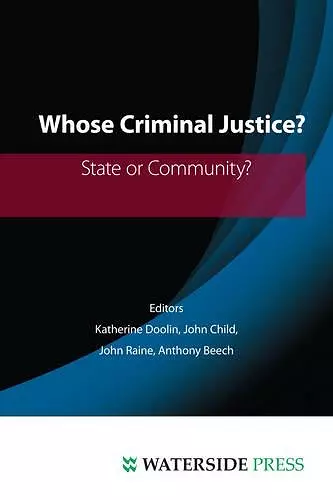Whose Criminal Justice?
State or Community
Katherine Doolin author John Child editor John Raine editor Anthony R Beech editor
Format:Paperback
Publisher:Waterside Press
Published:7th Feb '11
Should be back in stock very soon

All the editors and contributors to this book are members of The University of Birmingham's 'Community and Criminal Justice Group' (BCCJ Group). The overarching theme of the book is the balance between the role of central government in creating and shaping the regulatory framework of criminal justice and the potential for communities at local level to become more involved and to exercise more responsibility for themselves in responding to crime and anti-social behaviour in their midst. These twin dynamics are explored in the two main sections of the book. In Part I (The Regulatory State) through a series of case-studies, the authors examine how the central state has sought to address the risks and problems associated with crime and anti-social behaviour in modern times. They consider the new context for law and order which arose during the period under consideration and ask how and why new sanctions were put in place to regulate particular kinds of behaviour. They also highlight some of the unintended consequences, notably the criminalisation of more people. Then in Part II (Empowered Communities as Stakeholders in Criminal Justice) the book explores the potential for local communities playing a greater role in addressing the problems of crime and anti-social behaviour in their own neighbourhoods. In this section of the book the authors also consider the prospects for crime reduction through a more 'localist' approach in which citizens and communities play a more active part in a 'big society'. The book provides a timely and topical stock-taking of key issues and challenges within criminal justice. Through an exploration of the relative strengths and limitations of 'centrist' and 'localist' approaches to tackling crime and anti-social behaviour, it also offers a prescription of principles and priorities for a way forward.
'This is an extremely comprehensive text that has been written and constructed in an accessible way for students of this subject. The focus on risk, risk management and actuarialism in Chapter three provides a well-rounded and persuasive discussion over the extent of control and risk strategies. The issue of rights and liberties is maintained as a dominant thread throughout and readers are presented with a critical enagement with the practical, political and conceptual realities of modern criminal justice': Paul Taylor, University of Chester. 'This collection represents a timely discussion of one of the key issues facing criminal justice over the next decade: namely how to reconcile the new drive for localism with the need to ensure fairness and efficiency in an increasingly complex criminal justice system': Stephen Shute, Head of Sussex University Law School 'Provides a thoughtful and principled perspective on criminal justice at a time when the country seems ready to move on from the rigid attitudes and misguided assumptions that have dominated policy and practice for almost 20 years ... Policy makers and practitioners would do well to reflect on the wisdom that is contained in this book': David Faulkner, University of Oxford Centre for Criminological Research. Read the full review 'I found this text extremely useful in the consideration of this debate and it provides a number of thought provoking elements. An example being the focus upon the potential increase in security measures as a consequence of the perceived rise in the terrorist threat. It is not possible to investigate, just as it is not practical to prosecute, every perceived crime. As a result justice is a matter of choice and I found this text extremely helpful in exploring the concepts that result from such choice in terms of the tension between parochial and central influence': Peter Hall, Senior Lecturer in Forensic and Investigative Studies, Coventry University
ISBN: 9781904380627
Dimensions: unknown
Weight: unknown